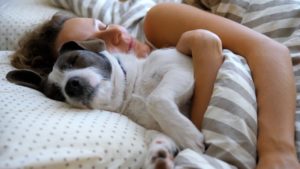Canal Side Family Dental is a 42 North Dental Care, PLLC practice and is owned and operated by dentists Dr. Samuel Shames, DDM. and Dr. Ronald Weissman, DDM. Gentle Dental is supported by 42 North Dental, LLC, a dental support organization that provides non-clinical administrative and business support services to the practice. 42 North Dental, LLC does not own or operate the dental practice or employ dentists to provide dental services. Find more information about 42 North Dental, LLC and the dental practices it supports at 42northdental.com.

A survey by the American Veterinary Medical Association found that roughly one-third of homes in the U.S. have a dog, while about one-quarter have a cat. There is no doubt that, as a culture, we place a high value on our furry companions! Many people even invite their pet into their bedroom at night, and it is common for them to share the same bed. If you choose to sleep with your four-legged friend, you should be aware of how their presence might be affecting the quality and quantity of your rest. In this article, we will discuss some advantages of sleeping with your pet, as well as the possible negative relationship between pets and sleep apnea.
Pets and Sleep
A study by the Mayo Clinic set out to examine how dogs affect sleep. All of the human participants were healthy and free of sleep disorders. The study found that the people slept best when they shared a bed with a human partner and a medium-sized dog was in the room, but not with them on the bed. It also uncovered that sharing a bed with a dog can disrupt sleep efficiency, which is a ratio that compares time spent in bed with time asleep. Fortunately, the disruption was not too severe for most people.
Other research indicates that even though pets might disrupt sleep, they often provide a relaxing sense of security and warmth. This may be especially true for children and individuals who do not sleep with a human partner.
What if You Have Sleep Apnea?
Obstructive sleep apnea near Bourne is a disorder that is marked by pauses in breathing throughout the night. It occurs when tissues in the throat block the upper airway. Without proper management, it can lead to serious health consequences.
Unfortunately, it is not generally a good idea for people with obstructive sleep apnea (OSA) to share a bedroom with their pets. Your pet’s movements, added to sleep disruptions caused by your disorder, can contribute to very low-quality rest. Additionally, if you have any sort of allergies to pet dander, sleeping with your pet may cause respiratory symptoms that further interfere with the quality and quantity of your sleep.
Of course, if you are getting treated for OSA, you might find that your pet’s presence in the bedroom has little to no effect on your condition. An oral sleep appliance may be the best type of treatment for pet-owners because, unlike a CPAP machine, oral appliances have no hoses or wires that a pet might chew on or trip on.
Whether or not you sleep with your pet is a personal decision, but you should be aware of how your furry friend’s presence might impact the quality of your shuteye.
Meet the Practice
The team at Canal Side Family Dental in Buzzards Bay has many decades of combined experience. One of our dentists even used to run a clinic that was dedicated to providing sleep apnea treatment. If you are concerned about the quality of your sleep, we would be pleased to consult with you. Reach out to us at 508-465-5256.
